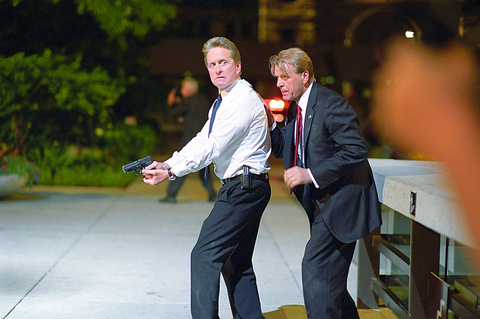Precise details can make a lot of baloney easier to swallow, and so it is with The Sentinel, an assassination plot that thickens with style.
Michael Douglas plays Pete Garrison, a secret service agent on duty so long that he took a bullet for former US president Ronald Reagan. Garrison is seemingly the last guy who could be accused of plotting to kill a US president, but that's the jam The Sentinel places him in, and it's a measure of the screenplay's effectiveness that we're not sure for a few minutes if he's innocent.
His chief accuser is fellow agent David Breckinridge (Kiefer Sutherland), who has a personal grudge against Garrison for an alleged marital indiscretion. Sex (and how to cover it up) is always an issue in Douglas' best roles, as it is here, since Garrison is having an affair with the first lady, Sarah Ballentine (Kim Basinger). Keeping their romance secret is how Garrison stumbles into this mess and plays a key role in its conclusion.

PHOTO COURTESY OF FOX
Right away, we know The Sentinel won't be entirely logical. Neither Garrison nor Ballentine would ever find themselves in this situation, and Breckinridge's trust of his colleague turns too quickly. However, director Clark Johnson displays so much attention to secret service mentality, small details such as surveillance and pursuit techniques, he enables viewers to buy into the falsehoods wrapped inside the reality. The Sentinel is slightly better than In the Line of Fire in that regard.
Unlike that consistently thrilling film, The Sentinel sags when the villains are revealed. Nobody on the wrong side has the scary flair of John Malkovich's assassin. No solid motive for killing the president is offered, not even insanity, despite occasional optical effects recalling familiar, unstable threats.
The chase is everything here, and screenwriter George Nolfi, working from Gerald Petievich's novel, spins a nail-nibbler.
Garrison's experience in the secret service keeps him one step ahead of his pursuers at every turn, resulting in several satisfying a-ha moments. Johnson may play a bit fast and loose with cellular telephone technology, but, again, the overall good sense pushes doubt aside.
It also helps that Nolfi doesn't allow cliches to intrude; when we see Eva Longoria (TV's Desperate Housewives) cast as a new agent, we expect her to become a love interest or a damsel in distress, and neither occurs. The movie keeps things together until the final few minutes, but by then we're sold on the story's possibilities.
The Sentinel is slickly produced, solidly acted and energetically edited by Cindy Mollo. It's standard material that doesn't quite follow standard operating procedure, and that makes a notable difference that a lot of other filmmakers could learn from.
The Sentinel
Directed by: Clark Johnson
Starring: Michael Douglas (Pete Garrison), Kiefer Sutherland (David Breckinridge), Eva Longoria (Jill Marin), Martin Donovan (William Montrose), Ritchie Coster (The Handler), Kim Basinger (first lady Sarah Ballentine)
Running time: 108 minutes
Taiwan Release: Today

The canonical shot of an East Asian city is a night skyline studded with towering apartment and office buildings, bright with neon and plastic signage, a landscape of energy and modernity. Another classic image is the same city seen from above, in which identical apartment towers march across the city, spilling out over nearby geography, like stylized soldiers colonizing new territory in a board game. Densely populated dynamic conurbations of money, technological innovation and convenience, it is hard to see the cities of East Asia as what they truly are: necropolises. Why is this? The East Asian development model, with

June 16 to June 22 The following flyer appeared on the streets of Hsinchu on June 12, 1895: “Taipei has already fallen to the Japanese barbarians, who have brought great misery to our land and people. We heard that the Japanese occupiers will tax our gardens, our houses, our bodies, and even our chickens, dogs, cows and pigs. They wear their hair wild, carve their teeth, tattoo their foreheads, wear strange clothes and speak a strange language. How can we be ruled by such people?” Posted by civilian militia leader Wu Tang-hsing (吳湯興), it was a call to arms to retake

This is a deeply unsettling period in Taiwan. Uncertainties are everywhere while everyone waits for a small army of other shoes to drop on nearly every front. During challenging times, interesting political changes can happen, yet all three major political parties are beset with scandals, strife and self-inflicted wounds. As the ruling party, the Democratic Progressive Party (DPP) is held accountable for not only the challenges to the party, but also the nation. Taiwan is geopolitically and economically under threat. Domestically, the administration is under siege by the opposition-controlled legislature and growing discontent with what opponents characterize as arrogant, autocratic

When Lisa, 20, laces into her ultra-high heels for her shift at a strip club in Ukraine’s Kharkiv, she knows that aside from dancing, she will have to comfort traumatized soldiers. Since Russia’s 2022 invasion, exhausted troops are the main clientele of the Flash Dancers club in the center of the northeastern city, just 20 kilometers from Russian forces. For some customers, it provides an “escape” from the war, said Valerya Zavatska — a 25-year-old law graduate who runs the club with her mother, an ex-dancer. But many are not there just for the show. They “want to talk about what hurts,” she